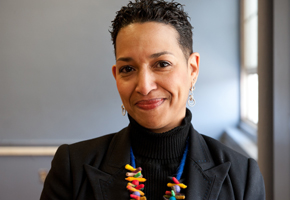The Board of Directors of Weeksville Heritage Center has appointed Tia Powell Harris as the third Executive Director of Brooklyn’s largest African American cultural institution.
Ms. Harris, who brings more than 20 years of experience creating, directing and promoting arts education and c for some of the most distinguished institutions in the country, will lead the organization in its efforts to significantly expand its education, programming and research capabilities and elevate its standing as one of the nation’s leading centers for African American history and culture. She will begin her tenure on March 17.
“We are beyond thrilled to have Tia join us,” said Timothy Simons, chair of the Weeksville board of directors. “Her energy, enthusiasm and record of success are what drew us to her. She will be an effective leader and powerful advocate for the institution as we seek to take WHC to the next level and transition into our new Education & Cultural Arts Center, which is slated to open later this year. Tia’s passion for arts education and the performing arts will also dramatically impact our program offerings as we focus on providing greater arts access to diverse and multi-generational audiences.”
Simons also recognized the tremendous contributions of WHC’s founder and first executive director, Joan Maynard, whose activism and vision helped start the organization in 1971, and Pam Green, an extraordinary leader for the past 12 years who led Weeksville’s transition from four historic houses to today’s cultural campus. “As we start this new chapter in Weeksville’s history, Tia will be instrumental in helping us to realize the vision of those who have come before while also charting out the right course for future success,” he said.
Ms. Harris joins WHC from the renowned Duke Ellington School of the Arts in Washington D.C., where she was, most recently, the Director of Artistic Affairs.
In that role, she was responsible for admissions and recruitment, grant management and reporting, grass roots fundraising efforts, institutional partnerships and outreach as well as overseeing all arts education programs and productions.
“I am very honored and humbled to have been given this great opportunity to lead such a dynamic and historical organization,” said Ms. Harris. “Weeksville is such an integral part of the African-American experience in this country. It must be preserved and nurtured for long-term sustainability. I am excited to continue the hard work of fulfilling the vision of my predecessors. What I see as critical for the success of the organization is expanding our donor base, programs and partnerships. I truly believe that Weeksville has a bright future and with the support of the City and our community it will flourish as a leading cultural arts institution in Central Brooklyn and beyond.”
As an arts educator for 20 years, Ms. Harris started her career as chairperson of the Theatre Department and Managing Director of The Ellington Company, an arts education consulting group and acting company. Following her work there, Ms. Harris served first as Manager of Community Partnerships at the John F. Kennedy Center for the Performing Arts and then as Associate Director of Education Programs at the Smithsonian’s National Portrait Gallery. While at the Smithsonian, Ms. Harris also co-chaired their Material Culture Forum. She also spent time as an adjunct faculty member in the graduate level Arts Management program at American University.
Ms. Harris earned a M.A. in Communication Arts & Theater and B.S. in Speech and Drama Education from the University of Maryland, College Park.
When the new 23,000 square-foot, LEED-Gold certified Education and Cultural Arts Center opens, WHC will become the first African American historic site to operate a contemporary arts center for the “Study of Freedom and Self Determination” and the first center dedicated to generating knowledge about freedom and 19th and 20th century African American, Caribbean and African history. It will give the community unprecedented access to performing arts, contemporary exhibitions, and public research training in self-documentation, all inspired by the legacy of the free African Americans who founded the community 175 years ago.



